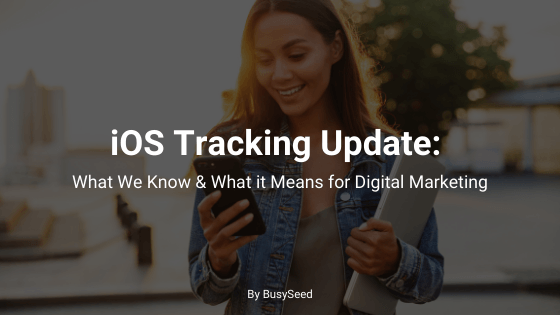iOS Tracking Update: What We Know & What it Means for Digital Marketing
Apple has rolled out changes with iOS 14 that impact how companies receive and process conversion events from tools like Facebook Pixel and Google Analytics. Business that advertise mobile apps, as well as those that optimize, target, and report on web conversion events from any business tools will be affected. Let's take a look at what this means for digital marketing.

Even before it arrived, the announcement of Apple’s iOS tracking update was already blowing through the digital marketing landscape like a hurricane. The update impacts the business model and revenue of many companies that rely on eCommerce activities for their livelihood.
Now that iOS 14 has arrived in full swing, we’ll help you assess its impact. Especially concerning Facebook advertising, digital marketing, and user privacy.
What does it portend for digital marketing?
How exactly did iOS 14 raise so much ruckus in the digital marketing ecosystem? While most of the attention centered on how it affects business tools like Facebook pixel, its impact extends beyond one company. So, you should also pay attention if you work with a digital agency.
What we know so far
Generally speaking, there are two big changes that the iOS 14 update has foisted on online companies and their users. The first is its bludgeoning of third-party cookies. Up till now, cookies have been the internet’s primary tool for remarketing and retargeting.
The second big change is the privacy policy.
App owners and developers have to provide their privacy policies to Apple. Otherwise, Apple wouldn't add them to the app store.
User permission for digital tracking
Apple prides itself on privacy. But the company went a step further at its Developer Conference in June 2020. It dropped the bombshell on iOS tracking, announcing users can now opt-out from in-app ad tracking.
Consequently, the iOS 14 tracking update displays a prompt that gives users a choice to decide whether they want an app to collect their data and track them.
Tracking occurs through IDFA, which is simply an identifier for advertising and acts as a cookie for mobile apps. If IDFA cookies are restricted, then the total number of users an app or brand adds to its audience is reduced.
IDFA accessibility affects the functionality of applications like Google Analytics.
According to Google, iOS 14 “will reduce visibility into key metrics that show how ads drive conversions (like app installs and sales).”
App tracking, transparency, and digital marketing
Not surprisingly, many in the advertising industry weren’t too pleased with the iOS tracking announcement.
Before the implementation of iOS tracking, Facebook started working hard to get partners on its platform to prepare for the change. It
announced that Apple’s changes would affect how it’s able to “receive and process conversion events from tools like the Facebook pixel.”
Facebook pixel helps digital marketers optimize and measure audiences for their ad campaigns. In response to the iOS tracking update, which effectively prohibits and limits certain data collection, Facebook created the
Aggregated Event Measurement.
The company will use
Aggregated Event Measurement to process pixel conversion events that occur on iOS 14 devices and higher. According to Facebook, the purpose is to adhere to the new user privacy while still enabling those on its platform to run effective ad campaigns.
Takeaway
With the iOS tracking update, Apple implemented some major changes to its features which provide users with greater control over their privacy.
User data is a huge asset to companies like Facebook, and Google whose business model relies on advertising revenue. They weren’t too happy with the update but have nonetheless rolled out features to help their partners.
Contact
BusySeed to help you navigate this new digital marketing ecosystem so you don’t lose exposure to your audience.











